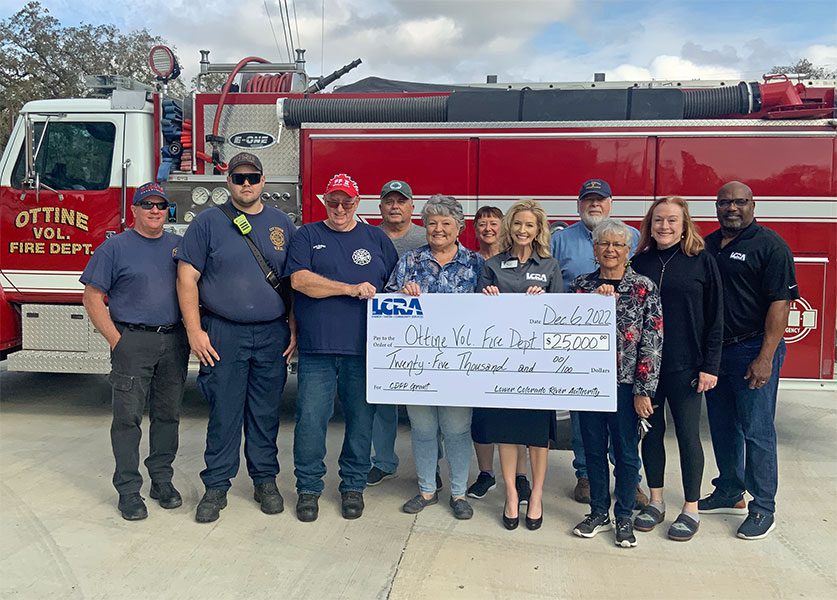LCRA awards $25,000 grant to Ottine Volunteer Fire Department
New cab and chassis will make aging brush truck more reliable
Dec. 6, 2022

The Community Development Partnership Program grant, along with $40,804 in matching funds from the department, will allow Ottine VFD to renovate its oldest brush truck to provide a faster and more reliable response to emergency calls and a safer vehicle for firefighters. The truck also will be used to respond to medical emergencies.
The department currently has an engine, tender and two brush trucks. Engines are primarily used for structure fires, wrecks and extrication, while brush trucks are used off-road to battle wildfires. The tender is used for water supply for all apparatus.
“Our oldest brush truck is from 2004 and has reached a point where it needs to be retired before it becomes a real safety issue,” Fire Chief John Everett said. “We’ve spent several thousand dollars in repairs in the last year and a half, but it keeps breaking down, and now we are having an overheating problem.”
He said the truck has become unreliable.
“Sometimes you jump in the truck, turn over the key and it doesn’t start,” Everett said. “It’s such a bad feeling when that happens. When you go into a fire, you have a lot on your mind. You want to concentrate on that, instead of having to concentrate on whether the truck will start or if it will get to the fire.”
Everett said that the lack of functional equipment can discourage new volunteers.
“When you get good volunteers and invest time and money in cultivating them to become excellent firefighters, it is a tragedy to lose them because of old worn-out equipment,” Everett said.
With help from the grant, Everett said he hopes the department will be able to keep firefighters in a better frame of mind and increase the chances of retaining them in the VFD.
Buying a new brush truck would cost the fire department about $150,000. With the new cab and chassis, the department will reuse the bed of the existing brush truck.
“It’s pretty much like getting a brand-new truck, but at half of the cost,” Everett said.
The department has been trying for two years to replace the brush truck.
“When I found out that we got the grant I wanted to start hollering and jumping,” Everett said. “I couldn’t wait to get back to the house and tell my wife and message all the guys in the department. You don’t get grants like this every day, when something like this comes along you really appreciate it.”
Ottine VFD serves the Ottine and Harwood area and provides mutual aid to Belmont, Gonzales, Luling and Waelder, as well as other parts of Caldwell and Guadalupe counties. It serves additional areas when called upon by the Texas A&M Forest Service.
The community grant is one of 46 grants awarded recently through LCRA’s Community Development Partnership Program, which helps volunteer fire departments, local governments, emergency responders and nonprofit organizations fund capital improvement projects in LCRA’s wholesale electric, water and transmission service areas. The program is part of LCRA’s effort to give back to the communities it serves.
Applications for the next round of grants will be accepted in January. More information is available at lcra.org/cdpp.
About LCRA
The Lower Colorado River Authority serves customers and communities throughout Texas by managing the lower Colorado River; generating and transmitting electric power; providing a clean, reliable water supply; and offering outdoor adventures at more than 40 parks along the Colorado River from the Texas Hill Country to the Gulf Coast. LCRA and its employees are committed to fulfilling our mission to enhance the quality of life of the Texans we serve through water stewardship, energy and community service. LCRA was created by the Texas Legislature in 1934 and receives no state appropriations. For more information, visit lcra.org.
Media Contact
Clara Tuma
512–578–3292
[email protected]


Social Media